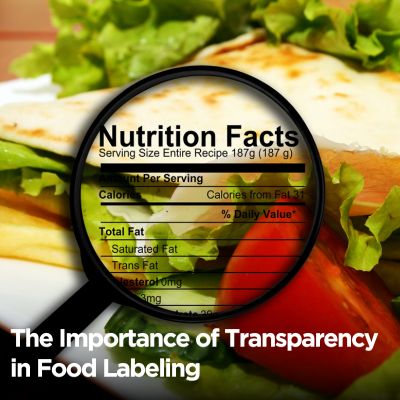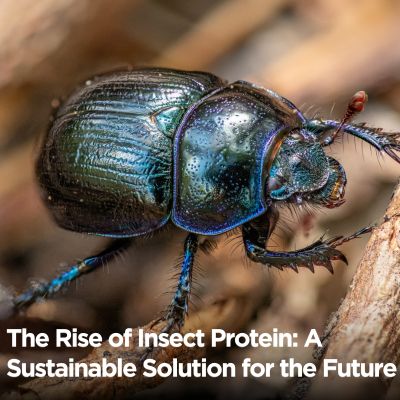As more people turn to sugar substitutes, the debate of natural vs. artificial sweeteners is gaining traction.
With a growing focus on health and the demand for low-calorie options, these sweeteners are becoming popular for those looking to reduce sugar intake. From drinks to desserts, they help satisfy sweet cravings without the extra sugar.
In this blog, we’ll explore the differences between natural and artificial sweeteners, focusing on their health benefits, flavor, and everyday uses.
Whether you’re choosing based on health goals, taste, or convenience, this guide will help you understand what each option offers.
What Are Sweeteners?
Sweeteners are substances used to add sweetness to food and drinks, giving them the enjoyable flavor we crave without the high sugar content.
They are popular for people who want to cut back on sugar but still enjoy something sweet. Whether for managing weight or controlling blood sugar, sweeteners make it possible to enjoy sweet treats without the same health risks associated with excess sugar.
The demand for both natural and artificial sweeteners has been growing steadily. For example, the natural sweetener market is expected to reach $6.5 billion in 2025, reflecting an increasing desire for healthier, lower-calorie alternatives.
Types of Sweeteners
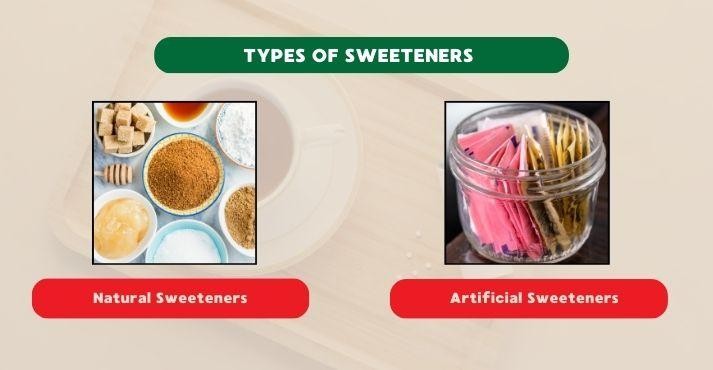
There are two main types of sweeteners: natural and artificial. Each has its properties, flavors, and uses, allowing consumers to choose the best sugar substitutes based on their preferences, health goals, or dietary needs.
1. Natural Sweeteners
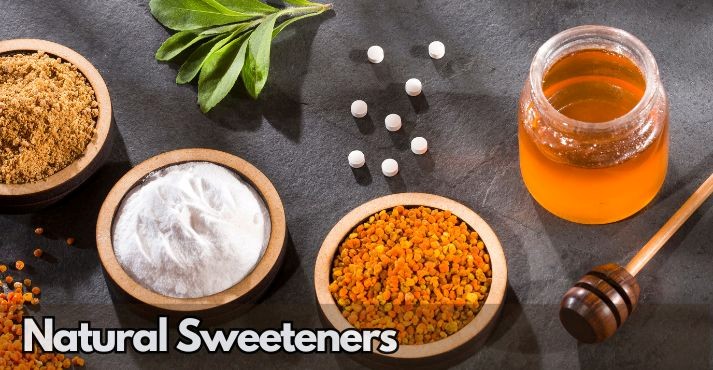
Natural sweeteners, like honey, maple syrup, and stevia, come from plant or animal sources and usually are minimally processed to retain their natural qualities. People who prefer whole-food options often choose these sweeteners.
Honey, for example, is rich in antioxidants and has been used for centuries for sweetness and medicinal properties. Similarly, stevia, a plant-based sweetener, has gained popularity due to its zero-calorie nature and high sweetness level without spiking blood sugar levels, making it great for those managing diabetes and following a vegan lifestyle.
Another favorite is maple syrup. It offers a unique flavor and some trace minerals, but due to its sugar content, it should be used in moderation.
Though natural, these sweeteners can still affect blood sugar and calorie intake. However, they are often considered healthier because they come from natural sources and are usually less processed than artificial sweeteners.
2. Artificial Sweeteners

On the other hand, artificial sweeteners are synthetically produced and are designed to offer sweetness without the added calories. Some of the most well-known artificial sweeteners include aspartame, sucralose, and saccharin.
These sweeteners are much sweeter than sugar, so only a tiny amount is needed to get the desired taste. This makes them popular in diet sodas and low-calorie products. For example, aspartame is commonly used in sugar-free gum, diet drinks, and sugar-free desserts.
Although artificial sweeteners are low in calories, they often spark debate. Some studies link them to headaches or digestive issues, although regulatory agencies like the FDA confirm their safety in approved amounts. Despite the controversy, they remain common in products for calorie-conscious consumers.
In the debate over natural sugar vs. processed sugar, many prefer natural options because they are less refined and have potential health benefits. However, processed sugars and artificial sweeteners are popular because they offer sweetness without the calorie load. Both have their place, depending on individual dietary needs.
Key Differences Between Natural and Artificial Sweeteners
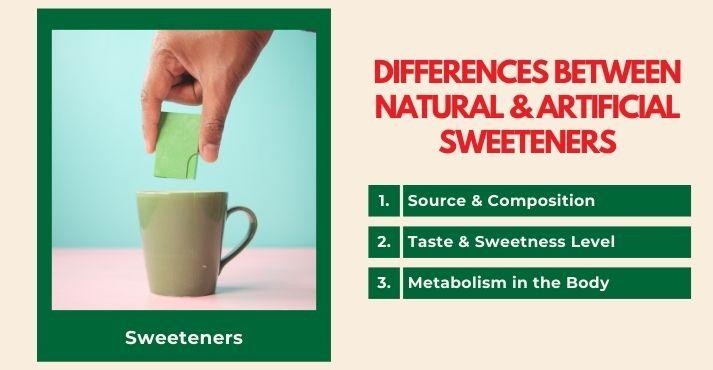
When it comes to sweeteners, natural and artificial options differ in ways that impact health, taste, and overall experience. Both provide sweetness but differ in origin, sweetness, strength, and how the body processes them.
In comparing artificial sweeteners vs. sugar, you’ll find that sugar adds more calories and can cause blood sugar spikes, while artificial sweeteners are low-calorie or calorie-free.
These differences are important for managing calorie intake, supporting metabolic health, or enjoying a preferred taste. Let’s explore how natural and artificial sweeteners compare across these areas:
1. Source and Composition
The main difference between natural and artificial sweeteners is their source. Natural sweeteners come from plants or animals and are less processed. Examples include honey, maple syrup, and stevia.
In 2023, honey dominated the natural sweeteners market, holding 36.4% of the market share. This was mainly due to its health benefits and rich flavor.
Natural sweeteners retain some nutrients, antioxidants, and other healthy compounds found in their sources. For example, honey contains small amounts of vitamins and minerals, like vitamin C and calcium.
On the other hand, artificial sweeteners are made in laboratories. They mimic sugar’s sweetness without the calories. Well-known examples are aspartame, sucralose, and saccharin.
These sweeteners are much sweeter than sugar and are used in smaller amounts to provide the same level of sweetness. Aspartame, for instance, is made by combining two amino acids: phenylalanine and aspartic acid.
2. Taste and Sweetness Level
Natural and artificial sweeteners differ in taste quite a bit. Natural sweeteners like honey and maple syrup have more complex flavors, adding earthy, floral, or caramel notes.
These sweeteners are also rich in nutrients such as vitamins and antioxidants—honey, for instance, contains vitamin C and calcium. However, they can also impact blood sugar levels, making them less suitable for those managing conditions like diabetes.
On the other hand, artificial sweeteners are much sweeter than sugar, often hundreds or even thousands of times sweeter.
While they provide the same sweetness with little to no calories, they can sometimes leave an aftertaste that many people find off-putting. This aftertaste can be challenging for some, as it lacks natural sweeteners’ rich, layered flavors.
3. Metabolism in the Body
The body processes natural and artificial sweeteners differently. Natural sweeteners like honey and maple syrup offer some nutritional benefits, much like natural food options. Honey contains antioxidants and a small amount of fiber to aid digestion, while maple syrup provides minerals like manganese and zinc.
On the other hand, artificial sweeteners don’t get processed by the body in the same way. Since they are much sweeter than sugar, only small amounts are needed, so they don’t add calories or raise blood sugar levels.
This is why artificial sweeteners are helpful for people with diabetes or those looking to cut calories. However, some can cause digestive issues for sensitive people, and there are concerns about potential long-term health effects.
The choice between natural sugar vs. artificial sugar ultimately depends on individual health goals, taste preferences, and lifestyle. Both have advantages, so it’s essential to understand their differences to make the best choice for your needs.
Pros and Cons of Natural Sweeteners
Natural sweeteners offer several advantages, but they also have some downsides. Let’s examine the pros and cons of using these:
Pros
Natural sweeteners have found their way into various snacks and confectionaries, offering consumers nutritional benefits over refined sugars. Honey, for example, contains antioxidants, which may reduce inflammation and support heart health.
Maple syrup is another excellent natural sweetener. It contains minerals like manganese, zinc, and calcium, which help strengthen bones and boost the immune system. These added nutrients make natural sweeteners more than just a source of sweetness.
Additionally, natural sweeteners are often minimally processed, especially compared to artificial options. Since they come directly from natural sources like plants or animals, they undergo little chemical alteration during production.
This retains their natural properties, making them an environmentally friendly option. For people who prioritize sustainability and eco-conscious eating, choosing natural sweeteners aligns with their values, as these products tend to have a smaller environmental footprint.
Cons
While natural sweeteners are healthier in some ways, they also have drawbacks. They still contain sugar and calories, which can make them less suitable for people trying to lose weight or manage conditions like diabetes.
For example, honey and maple syrup are natural and less processed, but they can still raise blood sugar levels like regular sugar.
Additionally, not all natural sweeteners are ideal for everyone. Diabetics, for example, need to be careful. Sweeteners like stevia may have little impact on blood sugar, but others, like agave nectar and honey, can cause noticeable spikes.
In short, while these sweeteners are generally considered healthier alternatives, it’s important to check labels and be mindful of any food additives that may affect your health goals.
Pros and Cons of Artificial Sweeteners
Artificial sweeteners have multiple advantages but also potential downsides. Here’s a closer look at their pros and cons:
Pros
Artificial sweeteners have a few key benefits. They are low or zero-calorie, making them a good option for people managing weight or diabetes. These sweeteners allow individuals to satisfy their sweet cravings without raising calorie intake or blood sugar.
Examples include aspartame and sucralose, commonly found in sugar-free drinks like diet sodas. Additionally, artificial sweeteners are cheaper to produce than natural ones, making them affordable for manufacturers and consumers.
Another advantage is that artificial sweeteners have a long shelf life. They don’t need refrigeration and stay stable at room temperature, which helps products last longer. This stability also reduces waste and offers consumers more affordable, long-lasting products.
Cons
Despite their low-calorie benefits, artificial sweeteners have several downsides. Some people experience digestive issues like bloating and gas, and growing concerns about their long-term safety exist.
Some studies suggest that consuming artificial sweeteners over extended periods might increase the risk of Type 2 diabetes and cardiovascular diseases. While regulatory agencies like the FDA deem them safe at approved levels, ongoing research highlights potential health risks of artificial sweeteners that remain under investigation.
Taste is another challenge with artificial sweeteners. Many leave a synthetic aftertaste that can be off-putting for consumers. For instance, aspartame and saccharin have a lingering bitterness that affects the overall flavor experience.
While some brands have worked to improve their taste profiles, this aftertaste continues to be a concern for many.
While artificial sweeteners can help reduce calorie intake and manage diabetes, they also have potential risks and taste challenges. Awareness of these factors can guide individuals in making better choices when selecting sweeteners.
Conclusion
Both natural and artificial sweeteners have their benefits and drawbacks, making them suitable for different dietary needs. Natural sweeteners like honey and maple syrup offer nutritional benefits but can still impact blood sugar levels, especially when paired with acidic foods that may affect digestion.
Artificial sweeteners, on the other hand, are calorie-free, which can help with weight management and diabetes. However, concerns about their long-term health effects and taste can limit their use.
Ultimately, the choice between natural sweeteners vs. artificial sweeteners depends on personal health goals, taste preferences, and lifestyle. The rise of healthy indulgence has influenced many people to seek alternatives that balance sweetness with nutritional benefits. You can select the sweetener that best suits your needs by considering the pros and cons.

